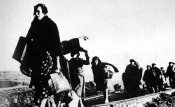The times they are hard and the wages are poor
None of us poor fellows has money in store
So how can a good man keep the wolf from the door?
Poor fellows, we all will go down:
When work it is scarce, tell me, how can we eat?
How can we afford to buy shoes for our feet
And how can we get clothing to keep off the sleet?
Poor fellows, we might as well drown.
If we could find labour we ne'er would complain
We'd work well for a master his favour to gain
We'd be honest and faithful with never a stain
But, poor fellows, how will we survive?
We could plough the good land, we could fish the salt sea
We could work in the woodland a-felling of trees
But when only the breath of our bodies is free,
Poor fellows, can we stay alive?
Now a man that is single, he's free of all care
He can soon leave a district if no work be there
There's no manner of hardship that he cannot bear
Poor fellows, if he is alone;
But a man with a family, his hands they are tied
He must look to their comfort or lose all his pride
He can't wander away but must stay by their side
Poor fellows, and maintain his home.
Oh a man that is willing can't understand why
He can find no employment how hard he may try
And it break his poor heart for to see his wife cry
So poor fellow, he'll do what he can;
And a man that is desperate and can't find a job
He will not be contended to sit home and sob
But he ever so honest, he'll turn out and rob
Poor fellow, to prove he's a man.
If a good man goes robbing, you know it's a shame
He brings scorn and misfortune on his honest name
But it pitiful straits, tell me, who is to blame?
Poor fellow, you know he must try;
So let's hope that these hard times they soon pass away
All unto our sweet saviour we earnestly pray
That this dark cloudy morn brings a glorious day
Poor fellows, some time ere we die.
None of us poor fellows has money in store
So how can a good man keep the wolf from the door?
Poor fellows, we all will go down:
When work it is scarce, tell me, how can we eat?
How can we afford to buy shoes for our feet
And how can we get clothing to keep off the sleet?
Poor fellows, we might as well drown.
If we could find labour we ne'er would complain
We'd work well for a master his favour to gain
We'd be honest and faithful with never a stain
But, poor fellows, how will we survive?
We could plough the good land, we could fish the salt sea
We could work in the woodland a-felling of trees
But when only the breath of our bodies is free,
Poor fellows, can we stay alive?
Now a man that is single, he's free of all care
He can soon leave a district if no work be there
There's no manner of hardship that he cannot bear
Poor fellows, if he is alone;
But a man with a family, his hands they are tied
He must look to their comfort or lose all his pride
He can't wander away but must stay by their side
Poor fellows, and maintain his home.
Oh a man that is willing can't understand why
He can find no employment how hard he may try
And it break his poor heart for to see his wife cry
So poor fellow, he'll do what he can;
And a man that is desperate and can't find a job
He will not be contended to sit home and sob
But he ever so honest, he'll turn out and rob
Poor fellow, to prove he's a man.
If a good man goes robbing, you know it's a shame
He brings scorn and misfortune on his honest name
But it pitiful straits, tell me, who is to blame?
Poor fellow, you know he must try;
So let's hope that these hard times they soon pass away
All unto our sweet saviour we earnestly pray
That this dark cloudy morn brings a glorious day
Poor fellows, some time ere we die.
Contributed by Bernart Bartleby - 2015/4/29 - 13:42
La voce del grande Peter Bellamy è asse portante anche del trio vocale "The Young Tradition" assieme ad Heather e Royston Wood, di cui vi invito tutti ad ascoltare le ardue, ardite e meravigliose interpretazioni. Quella in Inghilterra fu un'epopea fantastica tra gli anni 60 e i 70, peccato che troppo pochi ne abbiano goduto e quasi tutti questi giganti sono oramai pressochè dimenticati, che tristezza...
Flavio Poltronieri - 2015/4/29 - 17:42
Ciao Flavio,
su YouTube non sono riuscito a trovare "Us Poor Fellows" nell'esecuzione di Peter Bellamy, solo in quelle dei Cockersdale e di Ken Wilson (che non conosco).
In compenso ho trovato l'intera opera "The Transports" nel recente allestimento scenico della Crude Apache Theatre Company di Norwich.
Spero ti garbi.
Però, a giudicare dalla quantità di video relativi a canzoni di Peter Bellamy non direi che sia stato dimenticato, per fortuna!
su YouTube non sono riuscito a trovare "Us Poor Fellows" nell'esecuzione di Peter Bellamy, solo in quelle dei Cockersdale e di Ken Wilson (che non conosco).
In compenso ho trovato l'intera opera "The Transports" nel recente allestimento scenico della Crude Apache Theatre Company di Norwich.
Spero ti garbi.
Però, a giudicare dalla quantità di video relativi a canzoni di Peter Bellamy non direi che sia stato dimenticato, per fortuna!
Bernart Bartleby - 2015/4/29 - 22:17
"Us Poor Fellows" nell'opera originale di Peter Bellamy era cantata da Nic Jones...
B.B. - 2015/4/29 - 23:14
Caro, carissimo Bernart, non mi riferivo alla memoria degli anglosassoni, ci mancherebbe, ma a quella degli altri...
Flavio Poltronieri - 2015/5/1 - 12:41
×
![]()
Note for non-Italian users: Sorry, though the interface of this website is translated into English, most commentaries and biographies are in Italian and/or in other languages like French, German, Spanish, Russian etc.











Parole e musica di Peter Bellamy
In “The Transports. A Ballad Opera.”
Con la crema dei folksinger inglesi dell’epoca, tra cui The Watersons, Martin Carthy, Nic Jones, A. L. Lloyd, June Tabor, Martin Winsor, Cyril Tawney e Dave Swarbrick.
Un’opera che racconta una storia vera, quella di Henry Cabell e Susannah Holmes, “two poor fellows” che nel 1783 furono condannati alla deportazione per aver commesso dei furti a causa della miseria. I due erano amanti e dalla loro relazione era nato un bimbo ma ai due non fu in un primo momento concesso di sposarsi e la famigliola corse il serio rischio di essere smembrata. Uno dei loro carcerieri s’impietosì e intercesse per loro presso il ministro dell’interno.
Così Henry e Susannah poterono unirsi in matrimonio e nel 1787, dando corso alla sentenza, furono imbarcati con il figlioletto su uno degli 11 vascelli del convoglio battezzato “First Fleet”, il primo trasporto verso l’Australia. Dopo 250 tremendi giorni di navigazione le navi approdarono nell’attuale zona di Botany Bay (Sidney), dove fu allestito il primo insediamento europeo e anche la prima colonia penale inglese nel continente australiano.
Gli ambiziosi progetti artistici di Peter Bellamy, come l’opera “The Transports” e gli album dedicati alla poesia di Rudyard Kipling, gli valsero il plauso della critica ma un forte ostracismo commerciale. Privo di ingaggi per concerti nei club, Peter Bellamy scivolò gradatamente nella depressione, fino al suicidio commesso nel 1991.